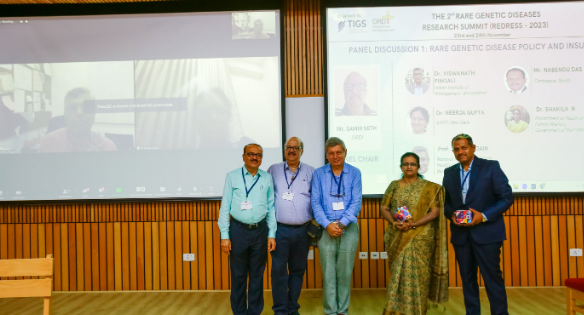Rare Genetic Diseases: Policy and Insurance
March 01, 2024 | Friday | Features | By Saniya Mehraj, Shivranjani Moharir, V Rajesh Iyer
Rare disease policy, which is an important framework set up by the government, was made in 2017 and was updated in 2021

The second Rare Genetic Disease Research Summit (REDRESS) 2023 spanned two consecutive days, the 23rd and 24th of November 2023 involving panel discussions on each day about different themes. The Day one panel discussion was themed “Rare genetic disease policy and insurance” and was chaired by Samir Sethi (Member, Indian Rett syndrome Foundation and Chairman of advocacy committee group, ORDI ) and distinguished panelists - Dr Vishwanath Pingali (Indian Institute of Management, Ahmedabad), Dr Neerja Gupta (All India Institute of Medical Sciences, Delhi), Prof. Sanjeev Jain (National Institute of Mental Health and Neurosciences, Bengaluru), MNabendu Das (Centogene, Greater Noida) and Dr Shakila N (Department of health and family welfare, Government of Karnataka, Nodal Officer for Sickle Cell Mission, Karnataka). The session was initiated with the introduction of panellists followed by discussions.
The rare disease policy, which is an important framework set up by the government, was made in 2017 and was updated in 2021. The discussion highlighted the need for understanding what the policy offers and how it can be improved further.
There are certain Centres of Excellence (CoEs) established by the government for rare disease diagnosis and treatments. Since these CoEs are tertiary care multi-speciality centres that are later designated as CoEs, there are some challenges associated with the system. The first challenge is to sensitize the medical staff, who otherwise receive patients with multiple medical manifestations, for the rare diseases. Due to heterogeneity of the conditions of the rare disease patients, it is difficult to tell the exact number of rare disease patients visiting the centres. Also in such conditions, the patients need to visit multiple wards and it is thus time consuming and is difficult for the patients as well as the clinicians. The procurement of the medicines, the associated paperwork, delays in receiving the drugs and the changes in the required dosage of the medicines that are weight dependent, are other associated challenges.
The discussion also highlighted the importance of assortment and standardization of rare diseases definition and classification, which, due to lack of epidemiological data, is not clear in the existing rare disease policy. It was suggested that there should be a universal consensus on the parameters that classify a certain genetic condition as rare. To attract recognition and support, setting up a standard is necessary. The CoEs maintain the registry of the rare disease patients that can be used to get the prevalence data necessary for research and development.
The proposition to incorporate RGDs into academic curriculum, complementing the existing courses accessible on the IAMG (Indian Academy of Medical Genetics) website, was advocated by the panellists. Also, establishing a well-structured Standard Operating Procedure (SOP) can be brought forward which is crucial for diagnosing patients, particularly those residing in remote locations, to prevent unnecessary travel. One effective measure is the doorstep collection of samples, minimizing the need for patients to commute.
The panel deliberated on the pivotal role of the government in the management and treatment of Rare Genetic Diseases (RGDs). Emphasizing the necessity of establishing unequivocal policies, the discussion underscored the government's responsibility to subsidize pharmaceuticals dedicated to the treatment of rare genetic conditions. A crucial observation underscores the potential of Government laboratories to motivate private industries to engage in the development of therapeutics for rare genetic diseases. The need to address awareness of RGDs among people can be a milestone in dealing with respite care and disease management apart from therapeutics and diagnostics. With the RGD patient-friendly infrastructure, the focus should be on the primary concern of the patients.
With the democratisation of knowledge after COVID-19, it's easier to create awareness of the therapeutics and discovery of potential drugs for RGDs. If more companies in India are established to tackle drug discovery, there will be an increase in treatment, in other words, the treatment won't be rare and hence the costs will be brought down without compromising the quality, as witnessed in the past 4-5 years. Supportive care should be the prime focus of the government, and the pavements and infrastructures should be RGD patient friendly. To avoid patient inconvenience, tele-calling facilities should be particularly formed for people suffering from RGD. Once the RGD prevalence data is clear, it can pave the way for the interests of startup builders in diagnostics and therapeutics.
Saniya Mehraj, Shivranjani Moharir, V Rajesh Iyer
Click here to read the next article on REDRESS 2023









